|
REVIEW
To summarise, which is never easy with Rushdie: the hero, Malik Solanka, is 55 (Rushdie's age). He was born in Bombay (ditto), on Methwold's Estate, off Warden Road (remember Midnight's Children?). In the 1980s, Malik gave up his tenured post at King's College, Cambridge (Rushdie's college), despairing of the "narrowness, infighting and ultimate provincialism" of academic life (the reasons, verbatim, that Rushdie gave us for leaving London).
Malik went from academia into showbusiness, doing "philosophical dolls" for TV: half Wittgenstein, half Thunderbirds. He creates little people, who then take on a life of their own. They have succeeded brilliantly, apart from one episode that was judged "blasphemous" and got him into hot water. Malik's dolls have spawned a vast franchise industry - just like Star Wars (a favourite Rushdie movie, one gathers). He's loaded.
Loaded, but unhappy. Malik has been married twice (like Rushdie) and has just, in the summer of 2000, left the second Mrs Solanka and his four-year-old child (let's leave the author's bio at this point; I suspect that he did as well). Malik's was an "an ideal family", but one night the "demons" got to him and he found himself hovering over his sleeping wife, carving knife in hand, Othello thoughts in mind. Why this homicidal impulse? The pressures of fame - or, as he puts it, those "satanic dolls" (get it?), which have poisoned him. Malik runs away - not from his family, but from what he might do to them. It is what alcoholics call a "geographical cure".
As the novel begins, Solanka is holed up in an upper Westside duplex, doing a "Mr Garbo". It is this time last year ("Gush v Bore" are neck and neck in the polls; Gladiator is on the big screen, Euro 2000 on the small). The narrative is refracted through the consciousness of the fury-tormented protagonist. Not much happens. Malik drinks too much, and fires his Polish housekeeper. An anti-Semitic plumber fixes his toilet. He gets wrenching phone calls from his deserted wife, Eleanor, and little son, Asmaan. "You abandoned us," she says, "but we have not abandoned you. Come home, darling. Please come home." Alas, a "power divorce" is all that is on offer.
Meanwhile, New York is chattering about a rash of cult murders, straight out of American Psycho. The killers dress in Disney clothes, bonk their beautiful victims with concrete after bonking them every other way, and scalp them. Malik has alcoholic blackouts and fears he may be a serial killer ("if the knife was possible, so was this").
Should he, like Tony Soprano, go to a shrink? "Fuck him, he was fictional," Malik decides. He gets his cure instead from a gorgeous Serb, Mila Milo. "The empress of West Seventieth Street", Mila is a hardbodied computer whiz and incest-survivor. "Some people do up houses," she announces. "I renovate people." Mainly with blowjobs, which you won't get from your psychotherapist (although big Tony lives in hope). Mila helps, but Malik soon drops her in favour of some even more gorgeous totty, Neela, an Indian beauty. When she walks through Central Park, t'ai chi practitioners topple over, rollerbladers collide, dogs lift their back legs and forget to pee, joggers run into trees. She's also very smart. In one of its many aspects, this novel looks like one of literature's longer love letters.
Malik Solanka is a version of his author, but he is also everyman. The fury which Rushdie analyses is universal in AD 2000 - flavour of the millennium. "These days the goddesses, less regarded, were hungrier, wilder, casting their nets more widely. As the bonds of family weakened, so the Furies began to intervene in all of human life." It's your story too, reader.
The narrative ends beautifully, with a recollection of the Larkin poem about mothers watching their kids in park playgrounds: "Something is pushing them / To the side of their own lives". Has he escaped the Furies? Are Malik's demons exorcised as he plays, united at last with Asmaan, on a bouncy-bouncy? The novel does not say.
|
